Napoleon Bonaparte (1769-1821) was a military general whose successes in the field eventually brought him the title of Emperor of France. Napoleon, who is usually known by his first name alone, is acknowledged as having greatly improved both organization and training in the military, as well as reforming the French education system. He was the sponsor of the Napoleonic Code, which remains the foundation of French civil law. Napoleon was twice captured by the British, eventually dying in exile on the Atlantic island of St. Helena.
Childhood and Early Life
Napoleon was born in Ajaccio, the capital of the island of Corsica, on August 15, 1769. He was the son of Carlo Buonaparte, a prominent lawyer who had at one time supported the Corsican nationalists in their resistance to the French occupation of the island, but had later pledged his allegiance to France. Carlo was then given a job as assessor of Ajaccio’s judicial district. The income from this post brought him the means to send his two surviving sons, Napoleon and Joseph, to the College d’Autun in mainland France.
Once there, Napoleon’s studies took him to Brienne, where he spent five years at its military college. After this, he went on to the Parisian military academy. Carlo, his father, died of stomach cancer in 1785, while Napoleon was studying at the academy. This event thrust upon his young son the responsibility of being head of his family. Napoleon graduated from the academy early and returned to Corsica the following year as a second lieutenant of artillery.
Napoleon and Revolutionary France
By this time, Napoleon had made the opposite philosophical choice of his father. He became a strong supporter of the Corsican resistance and an ally of Pasquale Paoli, who had once been Carlo’s associate. Although they possessed a formidable array of talents between them, the pair eventually quarreled. By the spring of 1793, when civil war broke out on the island, Napoleon had removed his family to the mainland of France. Once there, he decided to change his family’s name from the Italian Buonaparte to the French equivalent, Bonaparte.
 Napoleon resumed his service with the French army. He served with his regiment beginning in June, 1793 at Nice. He showed strong sympathies with the popular leftist Jacobin movement that had grown out of the recent French Revolution. By this time France had been proclaimed a republic. 1793 also saw the execution of its last pre-revolutionary monarch, King Louis XVI. The almost constant turmoil and uncertainty in France at this time meant that able, ambitious leaders such as Napoleon had a chance to shine.
Napoleon resumed his service with the French army. He served with his regiment beginning in June, 1793 at Nice. He showed strong sympathies with the popular leftist Jacobin movement that had grown out of the recent French Revolution. By this time France had been proclaimed a republic. 1793 also saw the execution of its last pre-revolutionary monarch, King Louis XVI. The almost constant turmoil and uncertainty in France at this time meant that able, ambitious leaders such as Napoleon had a chance to shine.
Although the new republic was originally intended to overthrow the tyrannical rule of the French kings, in reality it simply swapped one tyrant for another. The dictatorial Committee of Public Safety, headed by Maximilien Robespierre, exercised almost total power over French citizens. This period, which was later to be dubbed the Reign of Terror, was responsible for the deaths of up to 40,000 people. Robesepierre was himself executed when the Jacobins were toppled in 1795. After this the Directory became the ruling organization for the next four years.
Rise to Army Commander
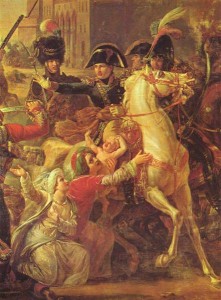 Perhaps due to his status as a potential alternative center for the loyalty of the French people, Napoleon soon lost favor with Robespierre. This might have endangered his life had the Jacobins not fallen from power. Instead, in 1795, the Directory rewarded Napoleon for his efforts in defending the French government from counter-revolutionaries. He was quickly appointed to command the Army of the Interior, as well as being given an influential advisory role on military affairs.
Perhaps due to his status as a potential alternative center for the loyalty of the French people, Napoleon soon lost favor with Robespierre. This might have endangered his life had the Jacobins not fallen from power. Instead, in 1795, the Directory rewarded Napoleon for his efforts in defending the French government from counter-revolutionaries. He was quickly appointed to command the Army of the Interior, as well as being given an influential advisory role on military affairs.
The following year France launched an attack on Austria. At this point Napoleon was given his preferred post as commander of the Army of Italy. This army was relatively weak, with a total strength of only 30,000. The troops were marred by poor morale and nutrition. Napoleon used his knowledge to restructure the army to the extent that it became immensely successful, winning many battles with Austria. This allowed the French Empire to expand substantially, and Napoleon himself to become seen as the country’s outstanding young commander.
In 1796, Napoleon married Joséphine Tascher de La Pagerie, the widow of a general who had been sent to the guillotine by Robespierre in the days of the Reign of Terror. He then had to deal with domestic incidents in which royalist elements within France wanted to restore the country’s monarchy. Next, Napoleon moved on to the Middle East. There his task was to take control of Egypt in order to weaken British influence and control in the region as well as causing disruption to its trading links with India.
Failure and Rebirth
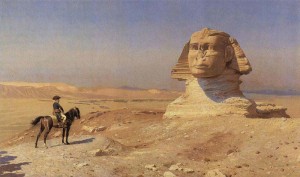 Once in north Africa, Napoleon suffered one of his most humiliating defeats. At the beginning of August, 1798, at the Battle of the Nile, Napoleon saw his forces annihilated by the navy of British admiral, Horatio Nelson. This caused great damage to Napoleon’s reputation, and Britain made an alliance with Turkey, Russia, and Austria as a result. Further military losses followed in 1799, when France was defeated on the Italian peninsula, resulting in France losing control over a large portion of Italy itself.
Once in north Africa, Napoleon suffered one of his most humiliating defeats. At the beginning of August, 1798, at the Battle of the Nile, Napoleon saw his forces annihilated by the navy of British admiral, Horatio Nelson. This caused great damage to Napoleon’s reputation, and Britain made an alliance with Turkey, Russia, and Austria as a result. Further military losses followed in 1799, when France was defeated on the Italian peninsula, resulting in France losing control over a large portion of Italy itself.
France’s internal dissent had not been quelled by these events. A Jacobin coup in June, 1799 resulted in the Directory being taken over by elements loyal to that group. Four months later, Napoleon went back to France and discussed with Emmanuel Sieyes, one of the newly installed directors, a plan for another coup. This would give Sieyes and Napoleon himself control of a newly constituted government to be known as the Consulate. In this they would be joined by a third man, Pierre-Roger Ducos.
From Consul to Emperor
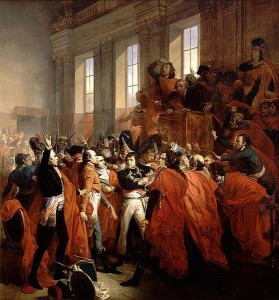 Napoleon was able to use his immense skill and knowledge of politics to influence the way in which the new constitution was drawn up. He placed at its head a First Consul, who in all but name was an outright dictator. The constitution allowed the holder of this post to appoint a vast range of men, from generals to ministers, even deciding who would sit in the legislative assemblies. Napoleon himself was to hold the rank of First Consul, and the proposed constitution was accepted in February, 1800.
Napoleon was able to use his immense skill and knowledge of politics to influence the way in which the new constitution was drawn up. He placed at its head a First Consul, who in all but name was an outright dictator. The constitution allowed the holder of this post to appoint a vast range of men, from generals to ministers, even deciding who would sit in the legislative assemblies. Napoleon himself was to hold the rank of First Consul, and the proposed constitution was accepted in February, 1800.
With effective power, Napoleon used his position to launch a wide range of reform. Economic, legal, and educational reforms were at the heart of this program. He also restored the Roman Catholic Church to its former position as France’s official religion. The Napoleonic Code dates from this time. The code banned anyone from being privileged through accident of birth, provided for freedom of religious worship, and required that the handing out of government jobs depend on ability rather than patronage.
Napoleon was also able to negotiate a peace between France and the other countries of Europe. This was broadly welcomed by war-weary Europeans after several years of fighting. By 1802, Napoleon had become highly popular at home and his election as consul for life was close to being a formality. In 1804, he went a step further, arranging for himself to be elected France’s first emperor. By this time, however, the peace he had negotiated had broken down and the United Kingdom, along with Austria and Russia, were once again at war with France.
Defeat at Sea; Success on Land
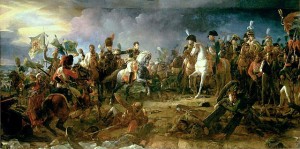 Napoleon, who had been brought up in the near-tideless Mediterranean, had a reputation, especially among the British, for not fully understanding the more complex mechanics of naval warfare in the open Atlantic. This reputation was reinforced in October, 1805 when the French fleet was shattered by the brilliance of Admiral Lord Nelson’s tactics at Trafalgar. As a result of this naval disaster, Napoleon was forced to abandon his long-cherished plans for the invasion of England, instead turning back to the European continent.
Napoleon, who had been brought up in the near-tideless Mediterranean, had a reputation, especially among the British, for not fully understanding the more complex mechanics of naval warfare in the open Atlantic. This reputation was reinforced in October, 1805 when the French fleet was shattered by the brilliance of Admiral Lord Nelson’s tactics at Trafalgar. As a result of this naval disaster, Napoleon was forced to abandon his long-cherished plans for the invasion of England, instead turning back to the European continent.
This approach paid almost immediate dividends, as France scored a great victory over the armies of both Russia and Austria at Austerlitz. Further triumphs on the battlefield were to follow, allowing a further great expansion in the size of Napoleon’s empire. Countries as far apart as Sweden and Spain fell under the rule of France.
Napoleon’s phase of great military successes came to an end in 1810, when the empire suffered a sobering series of losses; these came at great cost in both casualties and money. Two years later, his intended invasion of Russia turned into a humiliating and bloody disaster. Napoleon’s Grand Army had originally numbered more than half a million men but, by the end of the Russian campaign, more than 95 percent of these had either been killed or otherwise rendered unfit to fight.
Exile and Return
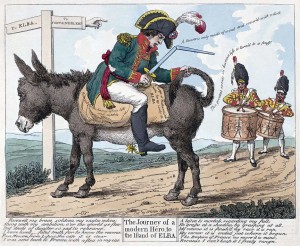 Napoleon’s enemies rejoiced at his difficulties, and a coup attempt was made within France itself during the abortive Russian campaign. This failed, but Britain was by then recording significant successes in French territories. Napoleon realized that he no longer possessed the means to mount an effective resistance against his attackers, and on March 30, 1814 he surrendered to the coalition led by the British. Napoleon himself went into exile, choosing the Tuscan island of Elba.
Napoleon’s enemies rejoiced at his difficulties, and a coup attempt was made within France itself during the abortive Russian campaign. This failed, but Britain was by then recording significant successes in French territories. Napoleon realized that he no longer possessed the means to mount an effective resistance against his attackers, and on March 30, 1814 he surrendered to the coalition led by the British. Napoleon himself went into exile, choosing the Tuscan island of Elba.
He did not remain there for long, becoming increasingly frustrated at France’s lack of direction. By March 1815, he was convinced that his country could not survive without him. He managed to escape from Elba, reaching Paris in triumph to assume leadership of the empire once again. However, although he had been given a rapturous welcome when he had first returned, this quickly faded, with all the old uncertainties about his style of leadership beginning to surface once again.
Despite the worries of many of his compatriots, Napoleon acted aggressively in taking France back to war, moving swiftly through Belgium to win a victory over the Prussians in June. This was to prove the final military success of his extraordinary career: two days later, on the field of Waterloo, he suffered a devastating and decisive defeat. The Seventh Coalition, led by the British Duke of Wellington, inflicted terrible, terrible damage with significant assistance from Prussian soldiers that Napoleon had so recently beaten.
Final Years
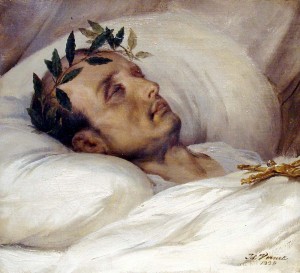 With nowhere left for him to go as a general, Napoleon abdicated as emperor on June 22, 1815. He attempted to convince the coalition to accept his son, the child Napoleon II, as emperor, but the suggestion was rejected outright by his opponents. Britain, which had been deeply embarrassed by Napoleon’s earlier escape from custody on Elba, decided that this time he should be sent to a much more distant location. They selected the remote island of St. Helena, thousands of miles away from France in the south Atlantic.
With nowhere left for him to go as a general, Napoleon abdicated as emperor on June 22, 1815. He attempted to convince the coalition to accept his son, the child Napoleon II, as emperor, but the suggestion was rejected outright by his opponents. Britain, which had been deeply embarrassed by Napoleon’s earlier escape from custody on Elba, decided that this time he should be sent to a much more distant location. They selected the remote island of St. Helena, thousands of miles away from France in the south Atlantic.
Although he was a prisoner here, Napoleon was allowed a substantial degree of freedom because of the impossibility of escape from the island. Before long he became weary of the unchanging daily routine of writing and reading, and took to spending much of the day inside. From 1817 onward, his health began to fail, and by the start of 1821 he was confined to his bed. In his will he asked that his ashes be scattered on the banks of the Seine in Paris. He died on May 5, 1821. The cause of death was officially stated to be stomach cancer, the same disease that had accounted for his father.
Napoleon has come to be remembered as one of the most significant generals that Europe has ever produced, although his work in civil matters is generally less acknowledged outside the French-speaking world. In Britain he is largely remembered as a failure due to his defeats by the British at Trafalgar and Waterloo. Nevertheless, the Napoleonic Wars, which bear his name, witness to the fact that for almost a generation this man from Corsica was the single most important figure in Europe.
